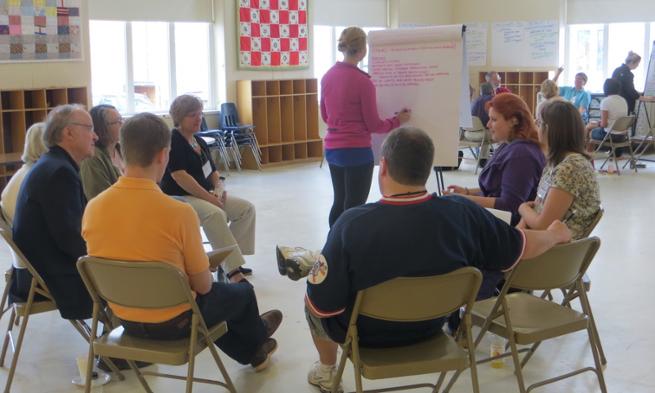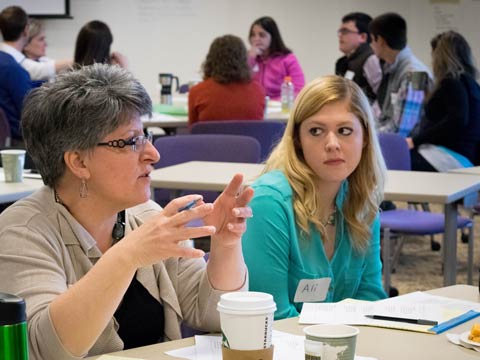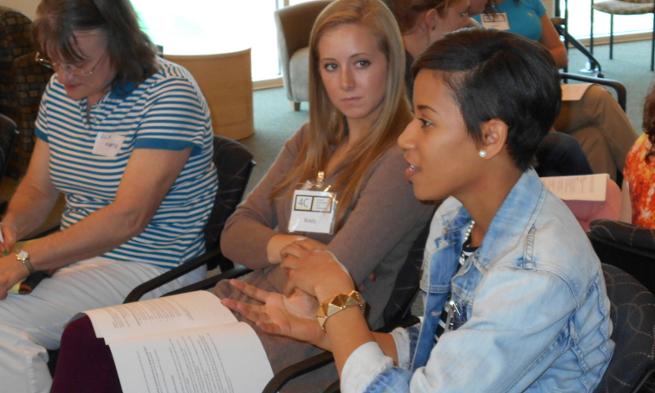A return to civility
Nation and World
From Winter 2016 Madison.
By Jim Heffernan (’96) and Kaity Kirwin (’16)
As the university named for the Father of the Constitution, JMU can play an important role in modeling and encouraging civil discourse. Too often, public dialogue on the important issues of our day degenerates into shouting matches, name-calling and a cry for the elimination of opposing viewpoints.
“If Madison were here today, I believe he would remind us of his level-headed assessment of our human limitations when we encounter and react to views that differ from our own, and of how we can all benefit from trying to listen to and understand the views of others with civility and respect, even as we hold and espouse our own cherished points of view,” JMU President Jonathan Alger said during a speech at Montpelier in 2012 that capped a weeklong celebration of his inauguration as Madison’s sixth president.

'We want to infuse the spirit of James Madison, the man, and the ways that he thought and engaged in public life, into this university.' — Lori Britt, director, ICAD
The Institute for Constructive Advocacy and Dialogue at JMU embraces this Madisonian ideal. The goal of the institute, which is housed in the School of Communication Studies, is to bridge the gap between the university and the community through outreach, service, research and scholarship centered on productive communication processes.
“I think it’s important for communication people, who have the ability to shape the world, to understand how they can also shape public spaces more productively,” says the institute’s director, Lori Britt, a professor of communication studies.
The public face of the institute is 4C: Campus Community Civic Collaborative, a partnership with the Fairfield Center in downtown Harrisonburg. The 4C collaborative trains passionate and impartial student communicators to design and facilitate public conversations, both at JMU and in the community.
The collaborative’s community forums are designed to bring people together around potentially divisive topics. Past workshops have focused on local issues such as having students as neighbors and the development of new bike and pedestrian paths in Harrisonburg-Rockingham County, as well as broader topics like mental health needs and the definition of marriage.

Students in Britt’s Facilitating Community Engagement class (SCOM 447) research topics of local interest and learn methods to frame community conversations to ensure that the dialogue is productive and all sides are being heard.
When facilitating public dialogue, Britt says it’s important to get participants to suspend their biases and assumptions about a topic temporarily. “This is not an argument. We’re not here for one side to win or lose. We’re here to help decide what our community should do if we are, in fact, looking for a choice.”
“We serve the community in a way that doesn’t make it seem like we’re infringing or inserting ourselves in the conversation,” adds graduate student facilitator Leanna Smithberger. “We’re not part of the discussion, we’re part of the process.”
The experience of facilitating public dialogue, Smithberger says, can also be applied to students’ personal and professional lives after they leave JMU. “You have the ability to be a leader and focus a group towards productivity.”
For those JMU students who wonder why they should engage with the Harrisonburg community, Smithberger has a simple response: “Because you live here.”
“I think many students see JMU as a home away from home, but they don’t see Harrisonburg as home,” she says. “But really the majority of your time is spent here. You have to get out and be a part of the community. You have to know who you are sharing this space with.”
'We’re not part of the discussion, we’re part of the process.' — Leanna Smithberger, graduate student facilitator
Britt sees potential in taking the Institute for Constructive Advocacy and Dialogue university-wide by involving students and faculty members from other colleges and departments, co-teaching courses and working in cross-disciplinary teams. “In order for students to be influential, they first have to be connected,” she says.
What better place to inspire a return to civil society than JMU?
“We want to infuse the spirit of James Madison, the man, and the ways that he thought and engaged in public life, into this university,” Britt says.

